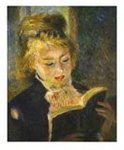 The Color Purple by Alice Walker
The Color Purple by Alice Walker1982, 289 pp.
1983 Pulitzer Prize/1983 NBA
Rating: 4
I read this for the Banned Book Challenge, and I can definitely see why people would be against it. Some of the themes include incest, rape, lesbianism, language, and drug and alcohol use. I'm not saying it should be banned--just that if I had a teenage daughter, for instance, I would want to read and discuss it with her.
All of the above (and more) happen to Celie, the main character in the book. By contrast, Celie tries to protect her sister Nettie, and Nettie ends up going with a missionary family to Africa. We see Celie and Nettie both grow in different ways through what happens to them. They are separated for 30 years but do keep in contact through letters. It is appalling, really, what men can do to women. This type of novel is always hard for me to read, but sometimes I do think it is necessary for me to venture out of my protected little world into the very unprotected world of other women. If only to appreciate and thank God for what I do have and to pray for and help other women whenever I can.









